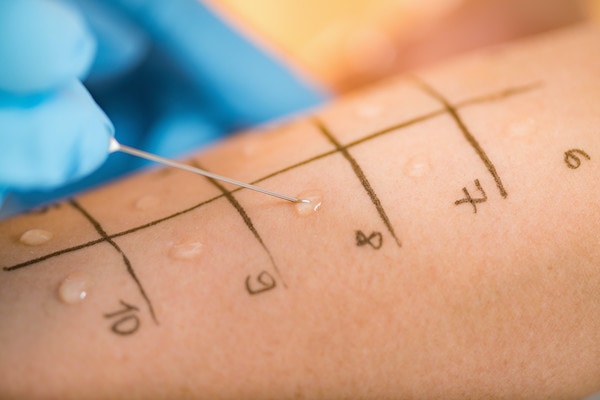ISO 21569 Allergen DNA Detection by PCR
The ISO 21569 standard provides a robust framework for detecting allergens in food and feed products using polymerase chain reaction (PCR) technology. This service is particularly critical for ensuring the safety of food and feed products, especially given the increasing awareness of food allergies and sensitivities among consumers.
Our laboratory specializes in providing accurate and reliable detection of major allergens such as peanuts, tree nuts, milk, eggs, fish, crustaceans, molluscs, soybeans, and wheat. The PCR-based method allows for precise identification even at trace levels, ensuring compliance with regulatory requirements and safeguarding consumer health.
The ISO 21569 standard is widely recognized as a leading practice in allergen detection due to its sensitivity, specificity, and reliability. Our team of experts ensures that every test conducted adheres strictly to this international standard, providing you with confidence in the results. We also offer complementary services like traceability audits and labeling compliance checks to ensure comprehensive support for your quality management systems.
Our state-of-the-art facilities are equipped with high-performance PCR instruments capable of handling various sample types, including raw materials, finished products, and packaging. This versatility allows us to cater to diverse client needs across the food and feed industry spectrum. From small-scale manufacturers to large corporations, our expertise ensures consistent quality and reliability in allergen testing.
Understanding the complexities involved in allergen detection is paramount for maintaining consumer trust and regulatory compliance. Our approach combines advanced technology with meticulous sample preparation and analysis techniques to deliver accurate results. By leveraging ISO 21569 guidelines, we provide robust evidence of adherence to global standards, thereby enhancing brand reputation and mitigating potential risks associated with allergen contamination.
For clients seeking deeper insights into their operations, our services extend beyond simple detection to include comprehensive analysis reports that highlight areas for improvement. These reports can be instrumental in refining production processes, improving supply chain management, and implementing effective control measures against allergen introduction during processing or packaging stages.
Why It Matters
Allergens pose significant health risks to individuals with sensitivities or allergies, making it essential for food and feed manufacturers to maintain strict quality controls throughout the supply chain. Adherence to standards such as ISO 21569 not only protects public health but also helps businesses avoid costly recalls and reputational damage.
Consumer demand for allergen-free products continues to grow, driven by increased awareness about potential life-threatening reactions. By implementing rigorous testing protocols based on international best practices like ISO 21569, food companies can build stronger relationships with consumers who value transparency and safety in their purchases.
Compliance with regulatory requirements is another crucial factor influencing why accurate allergen detection matters so much. Governments around the world have implemented various laws mandating proper labeling of potential allergens on product packaging. Failure to comply can result in legal penalties, fines, and even criminal charges against responsible parties.
In addition to these external pressures, internal factors such as brand reputation and operational efficiency also underscore the importance of effective allergen management programs. A well-executed allergen detection strategy contributes significantly towards reducing operational costs by minimizing waste due to cross-contamination incidents while simultaneously improving overall product quality.
Scope and Methodology
| Sample Types | Testing Procedures | Acceptance Criteria |
|---|---|---|
| Raw Materials | DNA extraction followed by PCR amplification targeting specific allergen sequences. | Positive results must match known reference samples for confirmation. |
| Finished Products | Preliminary screening using lateral flow immunoassays before proceeding to PCR analysis. | Absence of cross-contamination confirmed via multiple replicates yielding consistent negative results. |
| Surface swabs collected and subjected to DNA extraction followed by PCR amplification. | Presence of allergens should not exceed specified limits set forth in relevant regulations. |
The ISO 21569 standard specifies detailed procedures for sample preparation, including homogenization methods tailored to different matrix types. These steps are followed by DNA extraction processes designed specifically for food and feed samples, ensuring optimal recovery rates of target allergen sequences.
Once extracted DNA is subjected to PCR amplification targeting specific regions within the allergen genes. The amplified products undergo electrophoretic separation, visualization using gel documentation systems, and comparison against standard reference materials provided by recognized organizations like Codex Alimentarius Commission (CAC).
Customer Impact and Satisfaction
- Enhanced reputation through consistent compliance with international standards.
- Reduction in recall risks associated with allergen contamination incidents.
- Improved operational efficiency by identifying sources of contamination early.
- Increased consumer trust due to transparent communication regarding allergen testing practices.
- Competitive advantage in markets where stringent labeling regulations apply.
Customer satisfaction is paramount for us, and our commitment to delivering accurate results on time ensures ongoing partnership with clients across diverse sectors within the food industry. Positive feedback from satisfied customers attests to the reliability of our services, reinforcing our position as a trusted partner in allergen management.





